Examining Leadership and Management Roles within Aldi's Structure
VerifiedAdded on 2020/06/06
|11
|3215
|417
Report
AI Summary
This report offers an in-depth analysis of leadership and management practices within Aldi, a British retailer. It begins by differentiating between the roles and characteristics of leaders and managers, examining their distinct functions and responsibilities. The report then explores the application of leadership theories, including quality, functional, behavioral, and situational approaches, within Aldi's organizational structure. It evaluates these theories, highlighting their strengths and weaknesses, and discusses how they apply to various situations. The report also delves into the impact of the business environment on operational management and decision-making, providing a comprehensive overview of leadership and management in a real-world business context, supported by relevant literature and analysis.
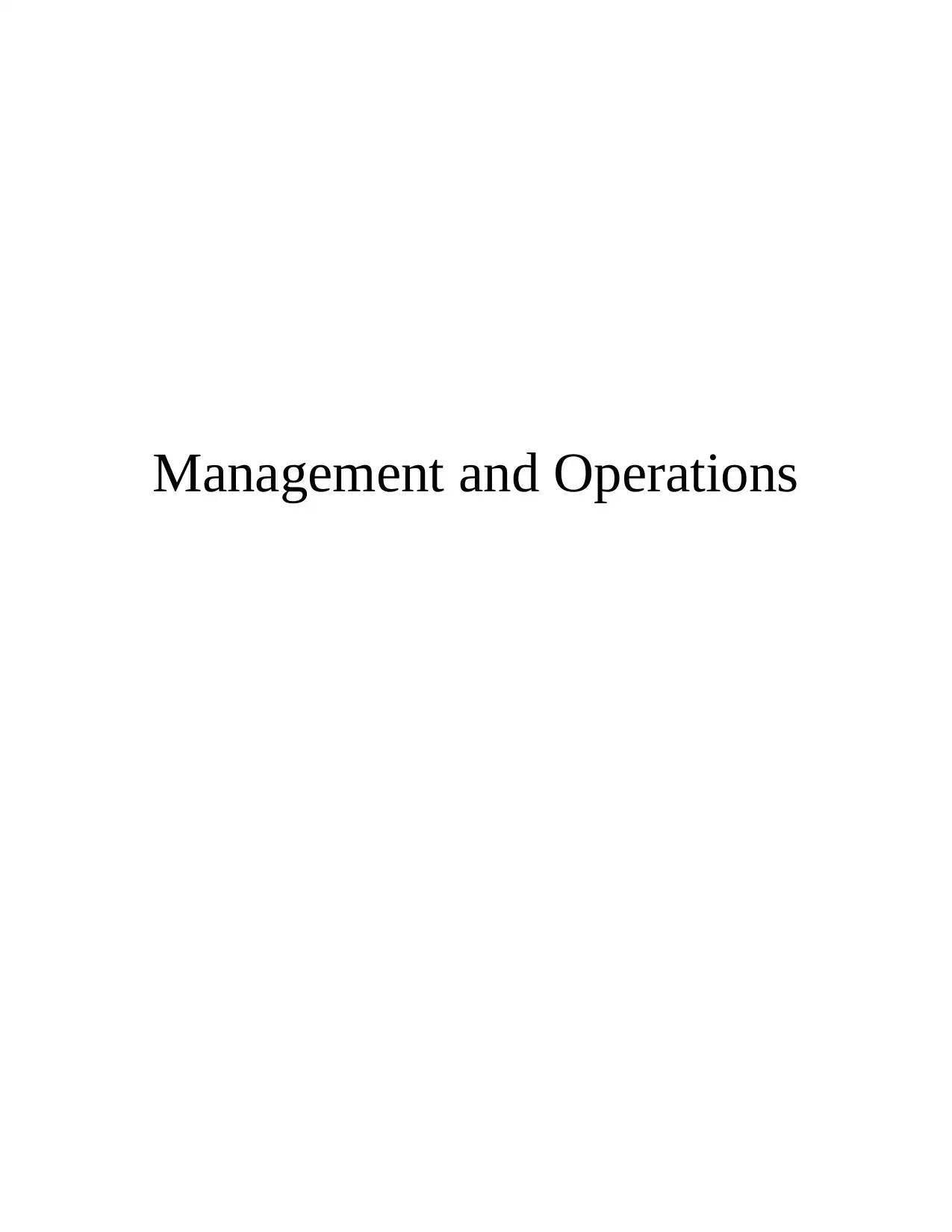
Management and Operations
Paraphrase This Document
Need a fresh take? Get an instant paraphrase of this document with our AI Paraphraser
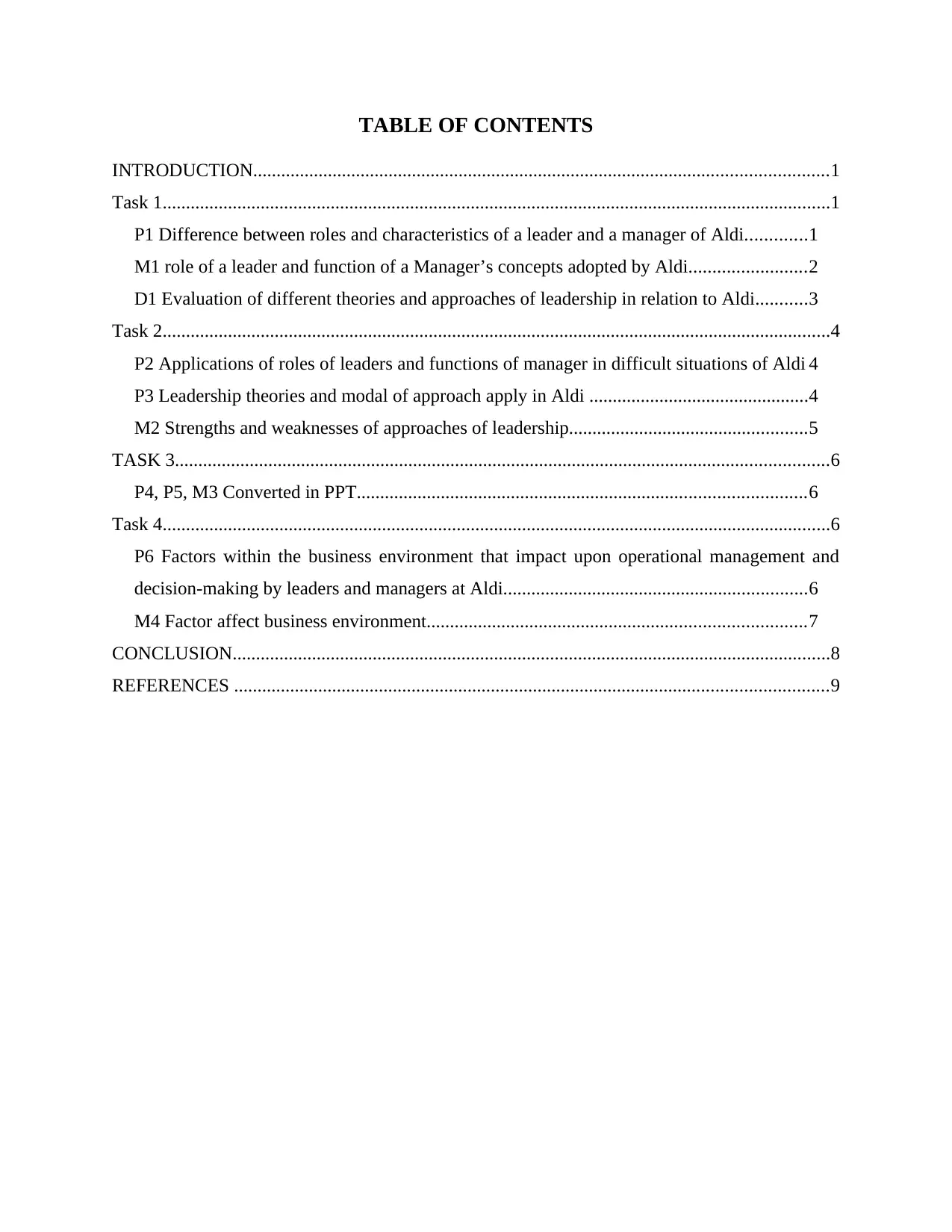
TABLE OF CONTENTS
INTRODUCTION...........................................................................................................................1
Task 1...............................................................................................................................................1
P1 Difference between roles and characteristics of a leader and a manager of Aldi.............1
M1 role of a leader and function of a Manager’s concepts adopted by Aldi.........................2
D1 Evaluation of different theories and approaches of leadership in relation to Aldi...........3
Task 2...............................................................................................................................................4
P2 Applications of roles of leaders and functions of manager in difficult situations of Aldi 4
P3 Leadership theories and modal of approach apply in Aldi ...............................................4
M2 Strengths and weaknesses of approaches of leadership...................................................5
TASK 3............................................................................................................................................6
P4, P5, M3 Converted in PPT................................................................................................6
Task 4...............................................................................................................................................6
P6 Factors within the business environment that impact upon operational management and
decision-making by leaders and managers at Aldi.................................................................6
M4 Factor affect business environment.................................................................................7
CONCLUSION................................................................................................................................8
REFERENCES ...............................................................................................................................9
INTRODUCTION...........................................................................................................................1
Task 1...............................................................................................................................................1
P1 Difference between roles and characteristics of a leader and a manager of Aldi.............1
M1 role of a leader and function of a Manager’s concepts adopted by Aldi.........................2
D1 Evaluation of different theories and approaches of leadership in relation to Aldi...........3
Task 2...............................................................................................................................................4
P2 Applications of roles of leaders and functions of manager in difficult situations of Aldi 4
P3 Leadership theories and modal of approach apply in Aldi ...............................................4
M2 Strengths and weaknesses of approaches of leadership...................................................5
TASK 3............................................................................................................................................6
P4, P5, M3 Converted in PPT................................................................................................6
Task 4...............................................................................................................................................6
P6 Factors within the business environment that impact upon operational management and
decision-making by leaders and managers at Aldi.................................................................6
M4 Factor affect business environment.................................................................................7
CONCLUSION................................................................................................................................8
REFERENCES ...............................................................................................................................9
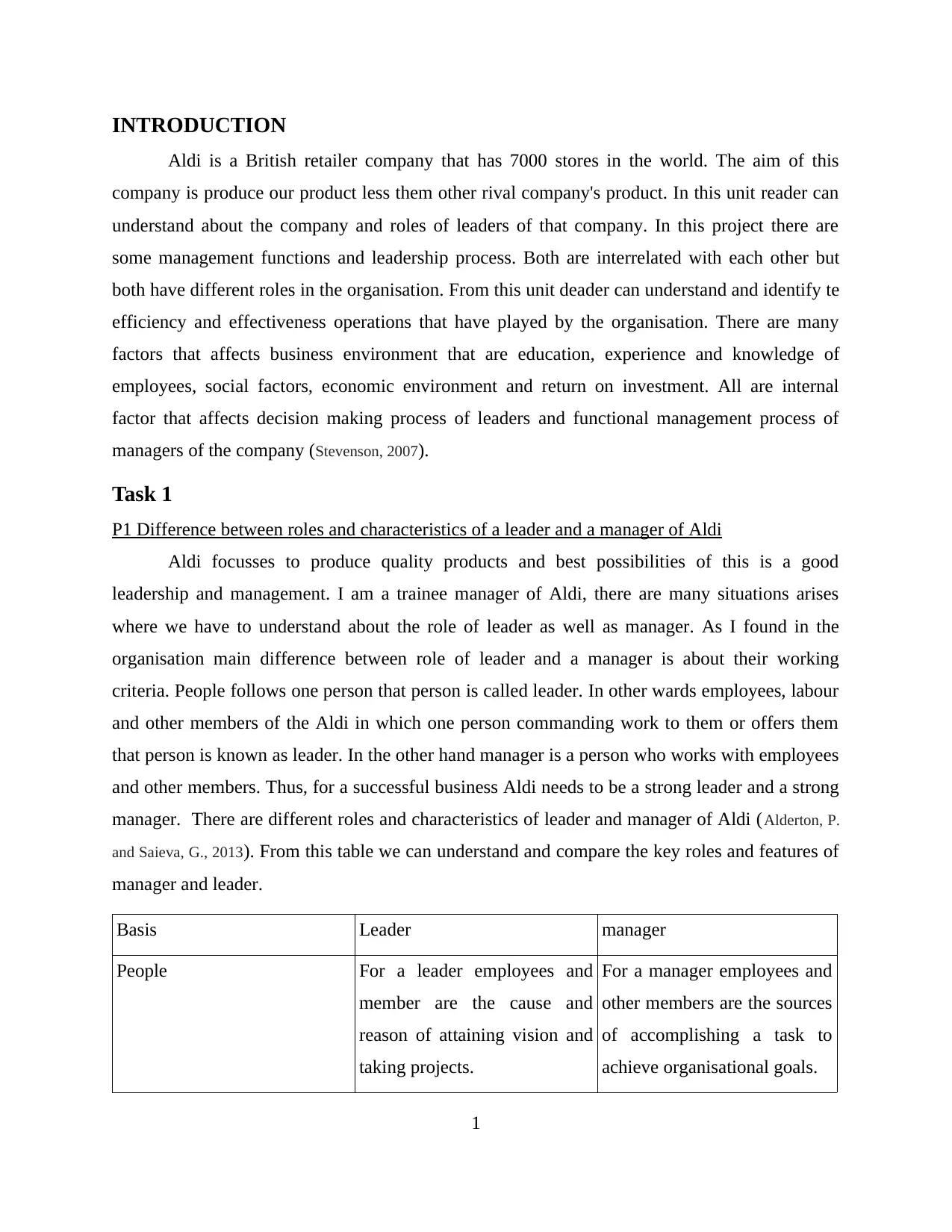
INTRODUCTION
Aldi is a British retailer company that has 7000 stores in the world. The aim of this
company is produce our product less them other rival company's product. In this unit reader can
understand about the company and roles of leaders of that company. In this project there are
some management functions and leadership process. Both are interrelated with each other but
both have different roles in the organisation. From this unit deader can understand and identify te
efficiency and effectiveness operations that have played by the organisation. There are many
factors that affects business environment that are education, experience and knowledge of
employees, social factors, economic environment and return on investment. All are internal
factor that affects decision making process of leaders and functional management process of
managers of the company (Stevenson, 2007).
Task 1
P1 Difference between roles and characteristics of a leader and a manager of Aldi
Aldi focusses to produce quality products and best possibilities of this is a good
leadership and management. I am a trainee manager of Aldi, there are many situations arises
where we have to understand about the role of leader as well as manager. As I found in the
organisation main difference between role of leader and a manager is about their working
criteria. People follows one person that person is called leader. In other wards employees, labour
and other members of the Aldi in which one person commanding work to them or offers them
that person is known as leader. In the other hand manager is a person who works with employees
and other members. Thus, for a successful business Aldi needs to be a strong leader and a strong
manager. There are different roles and characteristics of leader and manager of Aldi (Alderton, P.
and Saieva, G., 2013). From this table we can understand and compare the key roles and features of
manager and leader.
Basis Leader manager
People For a leader employees and
member are the cause and
reason of attaining vision and
taking projects.
For a manager employees and
other members are the sources
of accomplishing a task to
achieve organisational goals.
1
Aldi is a British retailer company that has 7000 stores in the world. The aim of this
company is produce our product less them other rival company's product. In this unit reader can
understand about the company and roles of leaders of that company. In this project there are
some management functions and leadership process. Both are interrelated with each other but
both have different roles in the organisation. From this unit deader can understand and identify te
efficiency and effectiveness operations that have played by the organisation. There are many
factors that affects business environment that are education, experience and knowledge of
employees, social factors, economic environment and return on investment. All are internal
factor that affects decision making process of leaders and functional management process of
managers of the company (Stevenson, 2007).
Task 1
P1 Difference between roles and characteristics of a leader and a manager of Aldi
Aldi focusses to produce quality products and best possibilities of this is a good
leadership and management. I am a trainee manager of Aldi, there are many situations arises
where we have to understand about the role of leader as well as manager. As I found in the
organisation main difference between role of leader and a manager is about their working
criteria. People follows one person that person is called leader. In other wards employees, labour
and other members of the Aldi in which one person commanding work to them or offers them
that person is known as leader. In the other hand manager is a person who works with employees
and other members. Thus, for a successful business Aldi needs to be a strong leader and a strong
manager. There are different roles and characteristics of leader and manager of Aldi (Alderton, P.
and Saieva, G., 2013). From this table we can understand and compare the key roles and features of
manager and leader.
Basis Leader manager
People For a leader employees and
member are the cause and
reason of attaining vision and
taking projects.
For a manager employees and
other members are the sources
of accomplishing a task to
achieve organisational goals.
1
⊘ This is a preview!⊘
Do you want full access?
Subscribe today to unlock all pages.

Trusted by 1+ million students worldwide
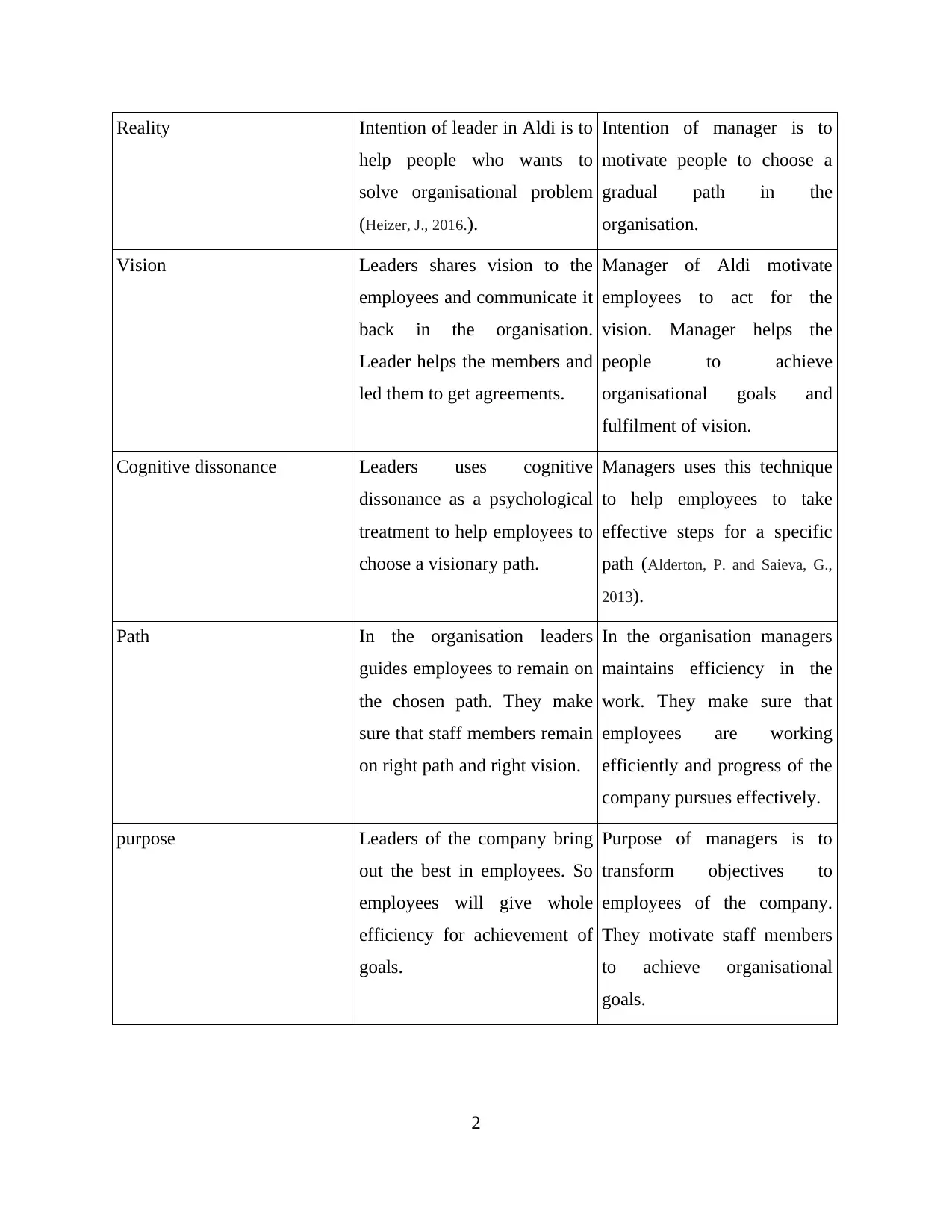
Reality Intention of leader in Aldi is to
help people who wants to
solve organisational problem
(Heizer, J., 2016.).
Intention of manager is to
motivate people to choose a
gradual path in the
organisation.
Vision Leaders shares vision to the
employees and communicate it
back in the organisation.
Leader helps the members and
led them to get agreements.
Manager of Aldi motivate
employees to act for the
vision. Manager helps the
people to achieve
organisational goals and
fulfilment of vision.
Cognitive dissonance Leaders uses cognitive
dissonance as a psychological
treatment to help employees to
choose a visionary path.
Managers uses this technique
to help employees to take
effective steps for a specific
path (Alderton, P. and Saieva, G.,
2013).
Path In the organisation leaders
guides employees to remain on
the chosen path. They make
sure that staff members remain
on right path and right vision.
In the organisation managers
maintains efficiency in the
work. They make sure that
employees are working
efficiently and progress of the
company pursues effectively.
purpose Leaders of the company bring
out the best in employees. So
employees will give whole
efficiency for achievement of
goals.
Purpose of managers is to
transform objectives to
employees of the company.
They motivate staff members
to achieve organisational
goals.
2
help people who wants to
solve organisational problem
(Heizer, J., 2016.).
Intention of manager is to
motivate people to choose a
gradual path in the
organisation.
Vision Leaders shares vision to the
employees and communicate it
back in the organisation.
Leader helps the members and
led them to get agreements.
Manager of Aldi motivate
employees to act for the
vision. Manager helps the
people to achieve
organisational goals and
fulfilment of vision.
Cognitive dissonance Leaders uses cognitive
dissonance as a psychological
treatment to help employees to
choose a visionary path.
Managers uses this technique
to help employees to take
effective steps for a specific
path (Alderton, P. and Saieva, G.,
2013).
Path In the organisation leaders
guides employees to remain on
the chosen path. They make
sure that staff members remain
on right path and right vision.
In the organisation managers
maintains efficiency in the
work. They make sure that
employees are working
efficiently and progress of the
company pursues effectively.
purpose Leaders of the company bring
out the best in employees. So
employees will give whole
efficiency for achievement of
goals.
Purpose of managers is to
transform objectives to
employees of the company.
They motivate staff members
to achieve organisational
goals.
2
Paraphrase This Document
Need a fresh take? Get an instant paraphrase of this document with our AI Paraphraser
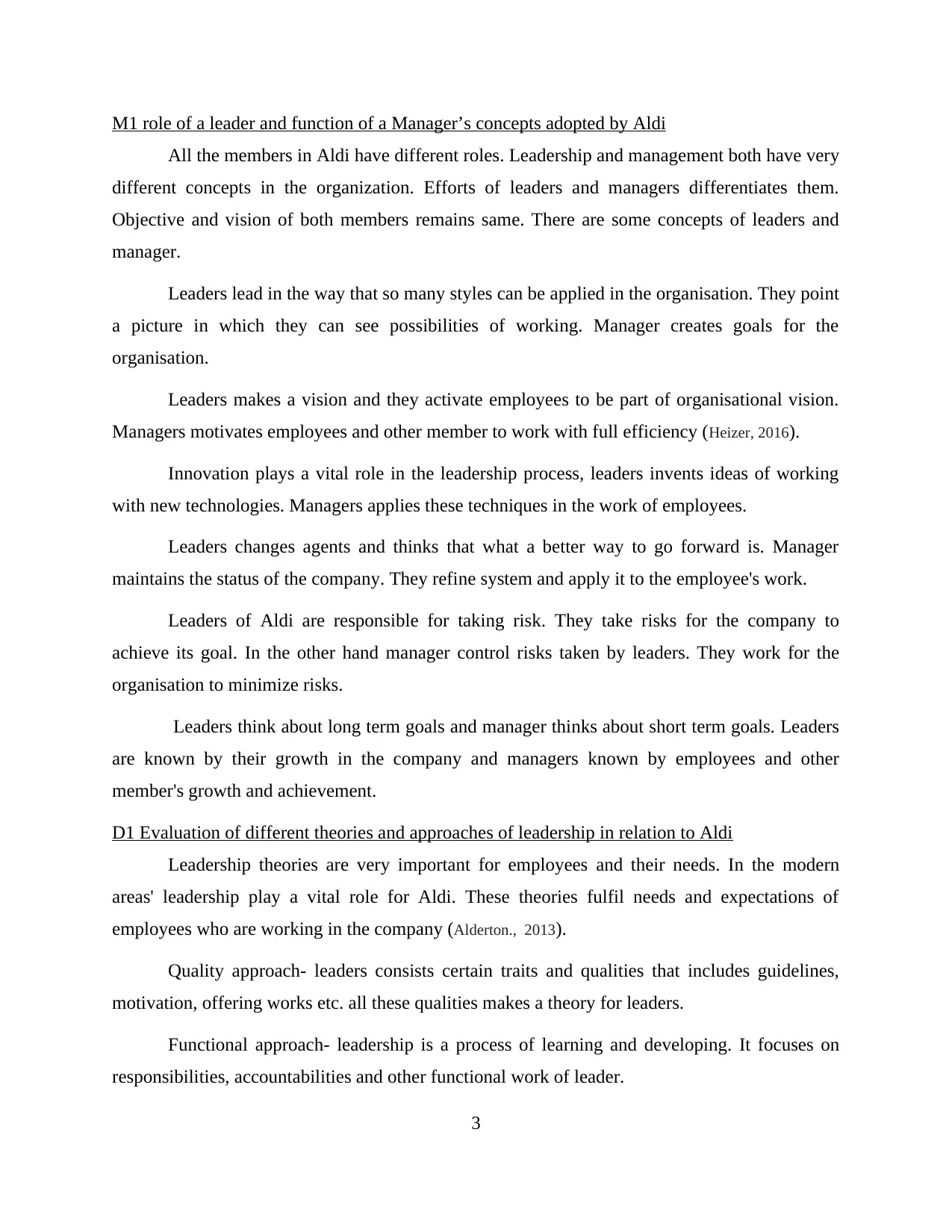
M1 role of a leader and function of a Manager’s concepts adopted by Aldi
All the members in Aldi have different roles. Leadership and management both have very
different concepts in the organization. Efforts of leaders and managers differentiates them.
Objective and vision of both members remains same. There are some concepts of leaders and
manager.
Leaders lead in the way that so many styles can be applied in the organisation. They point
a picture in which they can see possibilities of working. Manager creates goals for the
organisation.
Leaders makes a vision and they activate employees to be part of organisational vision.
Managers motivates employees and other member to work with full efficiency (Heizer, 2016).
Innovation plays a vital role in the leadership process, leaders invents ideas of working
with new technologies. Managers applies these techniques in the work of employees.
Leaders changes agents and thinks that what a better way to go forward is. Manager
maintains the status of the company. They refine system and apply it to the employee's work.
Leaders of Aldi are responsible for taking risk. They take risks for the company to
achieve its goal. In the other hand manager control risks taken by leaders. They work for the
organisation to minimize risks.
Leaders think about long term goals and manager thinks about short term goals. Leaders
are known by their growth in the company and managers known by employees and other
member's growth and achievement.
D1 Evaluation of different theories and approaches of leadership in relation to Aldi
Leadership theories are very important for employees and their needs. In the modern
areas' leadership play a vital role for Aldi. These theories fulfil needs and expectations of
employees who are working in the company (Alderton., 2013).
Quality approach- leaders consists certain traits and qualities that includes guidelines,
motivation, offering works etc. all these qualities makes a theory for leaders.
Functional approach- leadership is a process of learning and developing. It focuses on
responsibilities, accountabilities and other functional work of leader.
3
All the members in Aldi have different roles. Leadership and management both have very
different concepts in the organization. Efforts of leaders and managers differentiates them.
Objective and vision of both members remains same. There are some concepts of leaders and
manager.
Leaders lead in the way that so many styles can be applied in the organisation. They point
a picture in which they can see possibilities of working. Manager creates goals for the
organisation.
Leaders makes a vision and they activate employees to be part of organisational vision.
Managers motivates employees and other member to work with full efficiency (Heizer, 2016).
Innovation plays a vital role in the leadership process, leaders invents ideas of working
with new technologies. Managers applies these techniques in the work of employees.
Leaders changes agents and thinks that what a better way to go forward is. Manager
maintains the status of the company. They refine system and apply it to the employee's work.
Leaders of Aldi are responsible for taking risk. They take risks for the company to
achieve its goal. In the other hand manager control risks taken by leaders. They work for the
organisation to minimize risks.
Leaders think about long term goals and manager thinks about short term goals. Leaders
are known by their growth in the company and managers known by employees and other
member's growth and achievement.
D1 Evaluation of different theories and approaches of leadership in relation to Aldi
Leadership theories are very important for employees and their needs. In the modern
areas' leadership play a vital role for Aldi. These theories fulfil needs and expectations of
employees who are working in the company (Alderton., 2013).
Quality approach- leaders consists certain traits and qualities that includes guidelines,
motivation, offering works etc. all these qualities makes a theory for leaders.
Functional approach- leadership is a process of learning and developing. It focuses on
responsibilities, accountabilities and other functional work of leader.
3
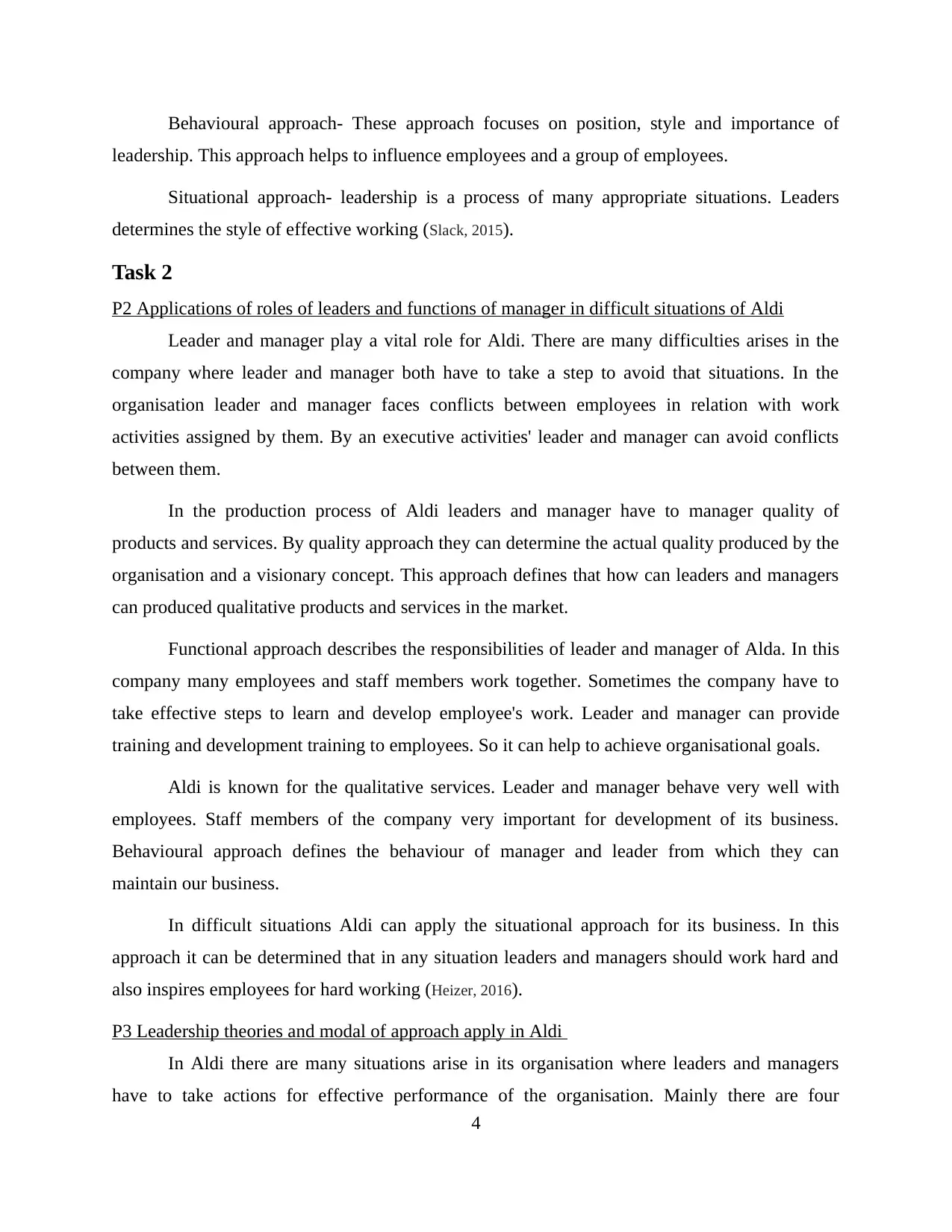
Behavioural approach- These approach focuses on position, style and importance of
leadership. This approach helps to influence employees and a group of employees.
Situational approach- leadership is a process of many appropriate situations. Leaders
determines the style of effective working (Slack, 2015).
Task 2
P2 Applications of roles of leaders and functions of manager in difficult situations of Aldi
Leader and manager play a vital role for Aldi. There are many difficulties arises in the
company where leader and manager both have to take a step to avoid that situations. In the
organisation leader and manager faces conflicts between employees in relation with work
activities assigned by them. By an executive activities' leader and manager can avoid conflicts
between them.
In the production process of Aldi leaders and manager have to manager quality of
products and services. By quality approach they can determine the actual quality produced by the
organisation and a visionary concept. This approach defines that how can leaders and managers
can produced qualitative products and services in the market.
Functional approach describes the responsibilities of leader and manager of Alda. In this
company many employees and staff members work together. Sometimes the company have to
take effective steps to learn and develop employee's work. Leader and manager can provide
training and development training to employees. So it can help to achieve organisational goals.
Aldi is known for the qualitative services. Leader and manager behave very well with
employees. Staff members of the company very important for development of its business.
Behavioural approach defines the behaviour of manager and leader from which they can
maintain our business.
In difficult situations Aldi can apply the situational approach for its business. In this
approach it can be determined that in any situation leaders and managers should work hard and
also inspires employees for hard working (Heizer, 2016).
P3 Leadership theories and modal of approach apply in Aldi
In Aldi there are many situations arise in its organisation where leaders and managers
have to take actions for effective performance of the organisation. Mainly there are four
4
leadership. This approach helps to influence employees and a group of employees.
Situational approach- leadership is a process of many appropriate situations. Leaders
determines the style of effective working (Slack, 2015).
Task 2
P2 Applications of roles of leaders and functions of manager in difficult situations of Aldi
Leader and manager play a vital role for Aldi. There are many difficulties arises in the
company where leader and manager both have to take a step to avoid that situations. In the
organisation leader and manager faces conflicts between employees in relation with work
activities assigned by them. By an executive activities' leader and manager can avoid conflicts
between them.
In the production process of Aldi leaders and manager have to manager quality of
products and services. By quality approach they can determine the actual quality produced by the
organisation and a visionary concept. This approach defines that how can leaders and managers
can produced qualitative products and services in the market.
Functional approach describes the responsibilities of leader and manager of Alda. In this
company many employees and staff members work together. Sometimes the company have to
take effective steps to learn and develop employee's work. Leader and manager can provide
training and development training to employees. So it can help to achieve organisational goals.
Aldi is known for the qualitative services. Leader and manager behave very well with
employees. Staff members of the company very important for development of its business.
Behavioural approach defines the behaviour of manager and leader from which they can
maintain our business.
In difficult situations Aldi can apply the situational approach for its business. In this
approach it can be determined that in any situation leaders and managers should work hard and
also inspires employees for hard working (Heizer, 2016).
P3 Leadership theories and modal of approach apply in Aldi
In Aldi there are many situations arise in its organisation where leaders and managers
have to take actions for effective performance of the organisation. Mainly there are four
4
⊘ This is a preview!⊘
Do you want full access?
Subscribe today to unlock all pages.

Trusted by 1+ million students worldwide
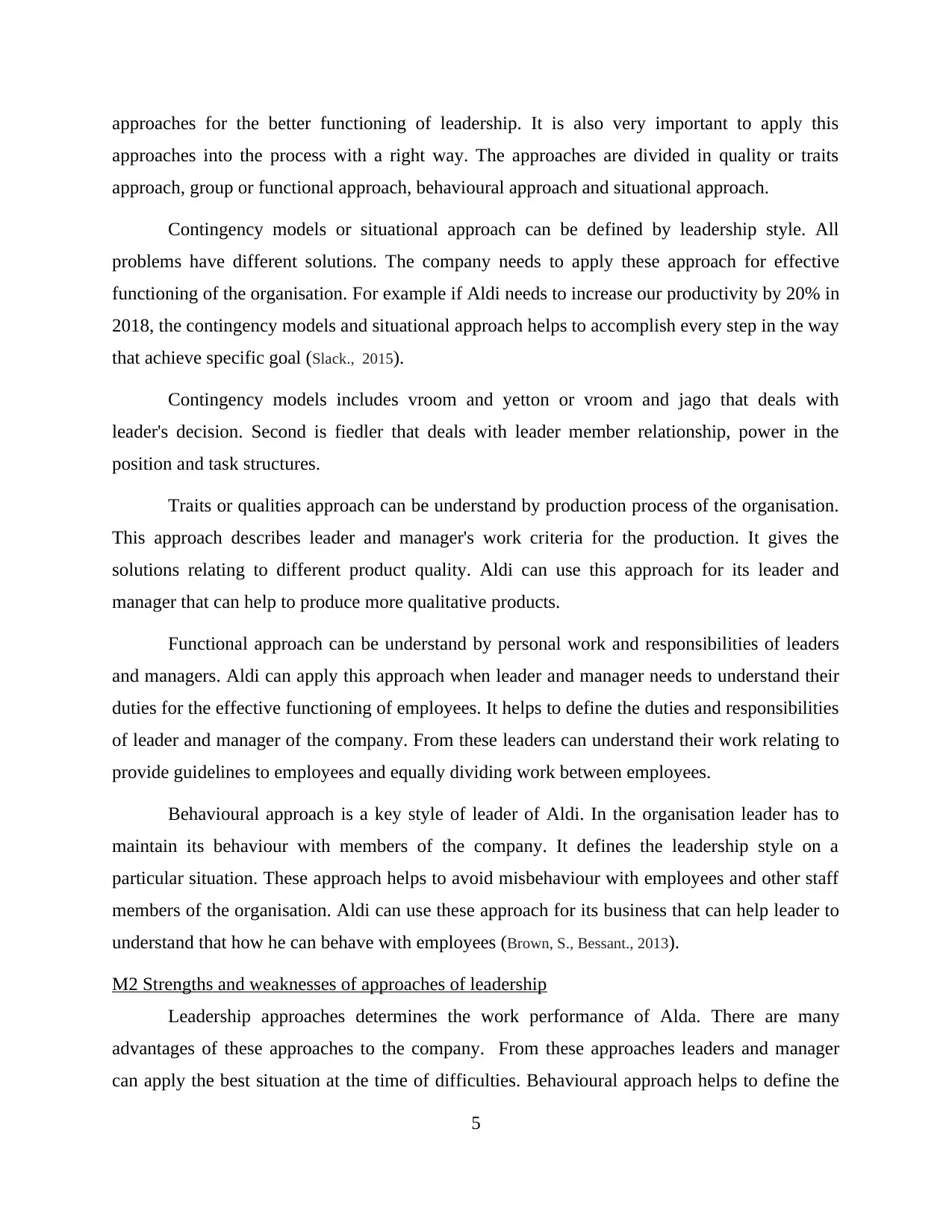
approaches for the better functioning of leadership. It is also very important to apply this
approaches into the process with a right way. The approaches are divided in quality or traits
approach, group or functional approach, behavioural approach and situational approach.
Contingency models or situational approach can be defined by leadership style. All
problems have different solutions. The company needs to apply these approach for effective
functioning of the organisation. For example if Aldi needs to increase our productivity by 20% in
2018, the contingency models and situational approach helps to accomplish every step in the way
that achieve specific goal (Slack., 2015).
Contingency models includes vroom and yetton or vroom and jago that deals with
leader's decision. Second is fiedler that deals with leader member relationship, power in the
position and task structures.
Traits or qualities approach can be understand by production process of the organisation.
This approach describes leader and manager's work criteria for the production. It gives the
solutions relating to different product quality. Aldi can use this approach for its leader and
manager that can help to produce more qualitative products.
Functional approach can be understand by personal work and responsibilities of leaders
and managers. Aldi can apply this approach when leader and manager needs to understand their
duties for the effective functioning of employees. It helps to define the duties and responsibilities
of leader and manager of the company. From these leaders can understand their work relating to
provide guidelines to employees and equally dividing work between employees.
Behavioural approach is a key style of leader of Aldi. In the organisation leader has to
maintain its behaviour with members of the company. It defines the leadership style on a
particular situation. These approach helps to avoid misbehaviour with employees and other staff
members of the organisation. Aldi can use these approach for its business that can help leader to
understand that how he can behave with employees (Brown, S., Bessant., 2013).
M2 Strengths and weaknesses of approaches of leadership
Leadership approaches determines the work performance of Alda. There are many
advantages of these approaches to the company. From these approaches leaders and manager
can apply the best situation at the time of difficulties. Behavioural approach helps to define the
5
approaches into the process with a right way. The approaches are divided in quality or traits
approach, group or functional approach, behavioural approach and situational approach.
Contingency models or situational approach can be defined by leadership style. All
problems have different solutions. The company needs to apply these approach for effective
functioning of the organisation. For example if Aldi needs to increase our productivity by 20% in
2018, the contingency models and situational approach helps to accomplish every step in the way
that achieve specific goal (Slack., 2015).
Contingency models includes vroom and yetton or vroom and jago that deals with
leader's decision. Second is fiedler that deals with leader member relationship, power in the
position and task structures.
Traits or qualities approach can be understand by production process of the organisation.
This approach describes leader and manager's work criteria for the production. It gives the
solutions relating to different product quality. Aldi can use this approach for its leader and
manager that can help to produce more qualitative products.
Functional approach can be understand by personal work and responsibilities of leaders
and managers. Aldi can apply this approach when leader and manager needs to understand their
duties for the effective functioning of employees. It helps to define the duties and responsibilities
of leader and manager of the company. From these leaders can understand their work relating to
provide guidelines to employees and equally dividing work between employees.
Behavioural approach is a key style of leader of Aldi. In the organisation leader has to
maintain its behaviour with members of the company. It defines the leadership style on a
particular situation. These approach helps to avoid misbehaviour with employees and other staff
members of the organisation. Aldi can use these approach for its business that can help leader to
understand that how he can behave with employees (Brown, S., Bessant., 2013).
M2 Strengths and weaknesses of approaches of leadership
Leadership approaches determines the work performance of Alda. There are many
advantages of these approaches to the company. From these approaches leaders and manager
can apply the best situation at the time of difficulties. Behavioural approach helps to define the
5
Paraphrase This Document
Need a fresh take? Get an instant paraphrase of this document with our AI Paraphraser
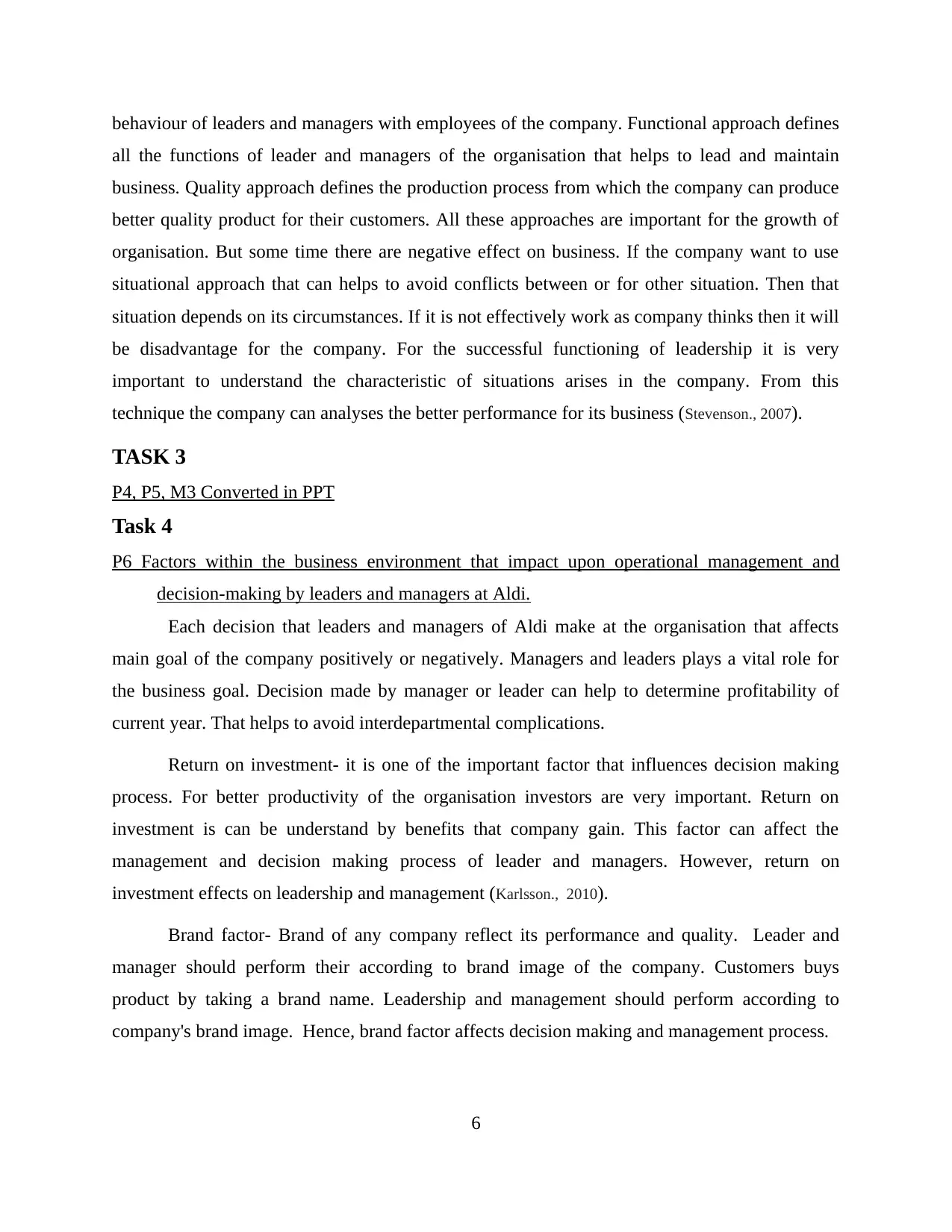
behaviour of leaders and managers with employees of the company. Functional approach defines
all the functions of leader and managers of the organisation that helps to lead and maintain
business. Quality approach defines the production process from which the company can produce
better quality product for their customers. All these approaches are important for the growth of
organisation. But some time there are negative effect on business. If the company want to use
situational approach that can helps to avoid conflicts between or for other situation. Then that
situation depends on its circumstances. If it is not effectively work as company thinks then it will
be disadvantage for the company. For the successful functioning of leadership it is very
important to understand the characteristic of situations arises in the company. From this
technique the company can analyses the better performance for its business (Stevenson., 2007).
TASK 3
P4, P5, M3 Converted in PPT
Task 4
P6 Factors within the business environment that impact upon operational management and
decision-making by leaders and managers at Aldi.
Each decision that leaders and managers of Aldi make at the organisation that affects
main goal of the company positively or negatively. Managers and leaders plays a vital role for
the business goal. Decision made by manager or leader can help to determine profitability of
current year. That helps to avoid interdepartmental complications.
Return on investment- it is one of the important factor that influences decision making
process. For better productivity of the organisation investors are very important. Return on
investment is can be understand by benefits that company gain. This factor can affect the
management and decision making process of leader and managers. However, return on
investment effects on leadership and management (Karlsson., 2010).
Brand factor- Brand of any company reflect its performance and quality. Leader and
manager should perform their according to brand image of the company. Customers buys
product by taking a brand name. Leadership and management should perform according to
company's brand image. Hence, brand factor affects decision making and management process.
6
all the functions of leader and managers of the organisation that helps to lead and maintain
business. Quality approach defines the production process from which the company can produce
better quality product for their customers. All these approaches are important for the growth of
organisation. But some time there are negative effect on business. If the company want to use
situational approach that can helps to avoid conflicts between or for other situation. Then that
situation depends on its circumstances. If it is not effectively work as company thinks then it will
be disadvantage for the company. For the successful functioning of leadership it is very
important to understand the characteristic of situations arises in the company. From this
technique the company can analyses the better performance for its business (Stevenson., 2007).
TASK 3
P4, P5, M3 Converted in PPT
Task 4
P6 Factors within the business environment that impact upon operational management and
decision-making by leaders and managers at Aldi.
Each decision that leaders and managers of Aldi make at the organisation that affects
main goal of the company positively or negatively. Managers and leaders plays a vital role for
the business goal. Decision made by manager or leader can help to determine profitability of
current year. That helps to avoid interdepartmental complications.
Return on investment- it is one of the important factor that influences decision making
process. For better productivity of the organisation investors are very important. Return on
investment is can be understand by benefits that company gain. This factor can affect the
management and decision making process of leader and managers. However, return on
investment effects on leadership and management (Karlsson., 2010).
Brand factor- Brand of any company reflect its performance and quality. Leader and
manager should perform their according to brand image of the company. Customers buys
product by taking a brand name. Leadership and management should perform according to
company's brand image. Hence, brand factor affects decision making and management process.
6
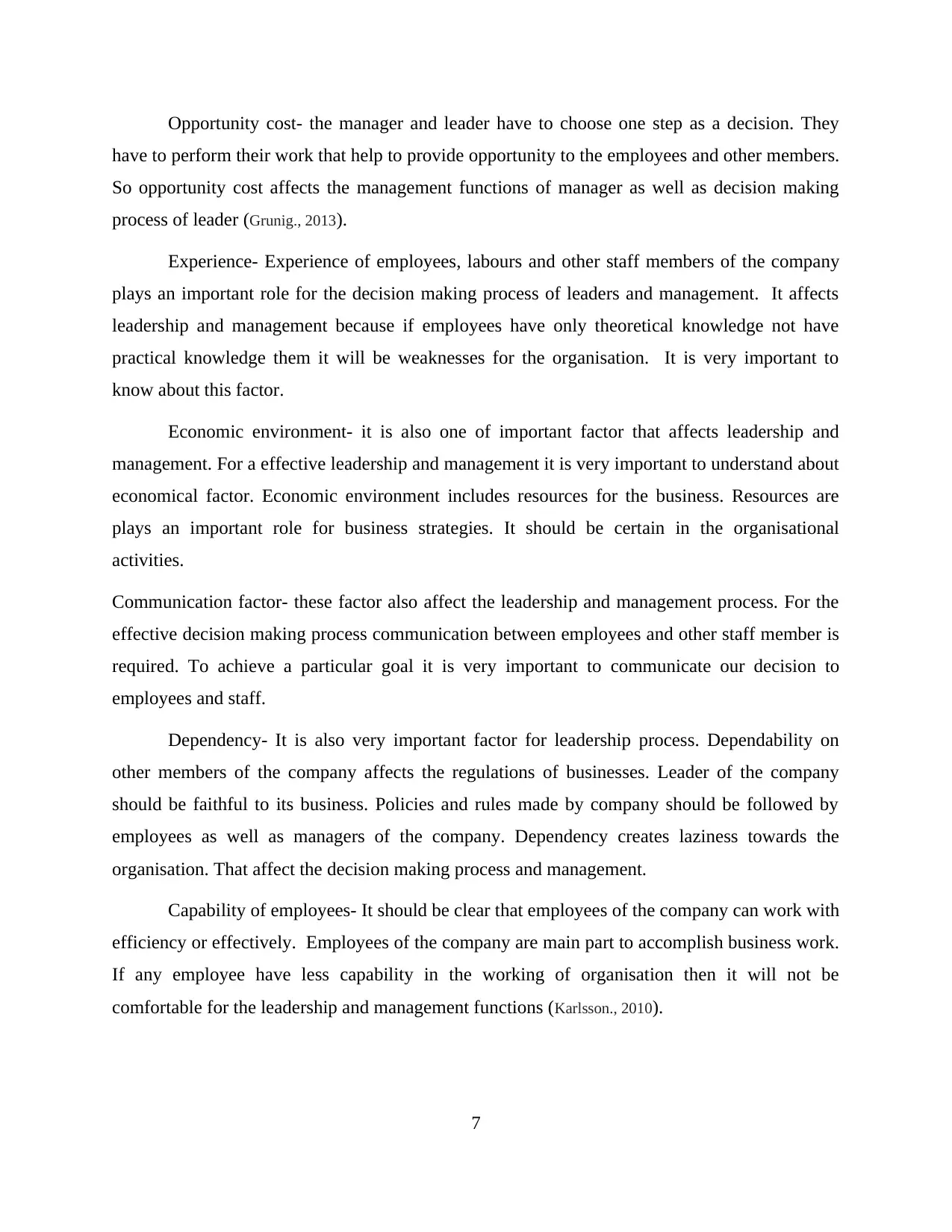
Opportunity cost- the manager and leader have to choose one step as a decision. They
have to perform their work that help to provide opportunity to the employees and other members.
So opportunity cost affects the management functions of manager as well as decision making
process of leader (Grunig., 2013).
Experience- Experience of employees, labours and other staff members of the company
plays an important role for the decision making process of leaders and management. It affects
leadership and management because if employees have only theoretical knowledge not have
practical knowledge them it will be weaknesses for the organisation. It is very important to
know about this factor.
Economic environment- it is also one of important factor that affects leadership and
management. For a effective leadership and management it is very important to understand about
economical factor. Economic environment includes resources for the business. Resources are
plays an important role for business strategies. It should be certain in the organisational
activities.
Communication factor- these factor also affect the leadership and management process. For the
effective decision making process communication between employees and other staff member is
required. To achieve a particular goal it is very important to communicate our decision to
employees and staff.
Dependency- It is also very important factor for leadership process. Dependability on
other members of the company affects the regulations of businesses. Leader of the company
should be faithful to its business. Policies and rules made by company should be followed by
employees as well as managers of the company. Dependency creates laziness towards the
organisation. That affect the decision making process and management.
Capability of employees- It should be clear that employees of the company can work with
efficiency or effectively. Employees of the company are main part to accomplish business work.
If any employee have less capability in the working of organisation then it will not be
comfortable for the leadership and management functions (Karlsson., 2010).
7
have to perform their work that help to provide opportunity to the employees and other members.
So opportunity cost affects the management functions of manager as well as decision making
process of leader (Grunig., 2013).
Experience- Experience of employees, labours and other staff members of the company
plays an important role for the decision making process of leaders and management. It affects
leadership and management because if employees have only theoretical knowledge not have
practical knowledge them it will be weaknesses for the organisation. It is very important to
know about this factor.
Economic environment- it is also one of important factor that affects leadership and
management. For a effective leadership and management it is very important to understand about
economical factor. Economic environment includes resources for the business. Resources are
plays an important role for business strategies. It should be certain in the organisational
activities.
Communication factor- these factor also affect the leadership and management process. For the
effective decision making process communication between employees and other staff member is
required. To achieve a particular goal it is very important to communicate our decision to
employees and staff.
Dependency- It is also very important factor for leadership process. Dependability on
other members of the company affects the regulations of businesses. Leader of the company
should be faithful to its business. Policies and rules made by company should be followed by
employees as well as managers of the company. Dependency creates laziness towards the
organisation. That affect the decision making process and management.
Capability of employees- It should be clear that employees of the company can work with
efficiency or effectively. Employees of the company are main part to accomplish business work.
If any employee have less capability in the working of organisation then it will not be
comfortable for the leadership and management functions (Karlsson., 2010).
7
⊘ This is a preview!⊘
Do you want full access?
Subscribe today to unlock all pages.

Trusted by 1+ million students worldwide
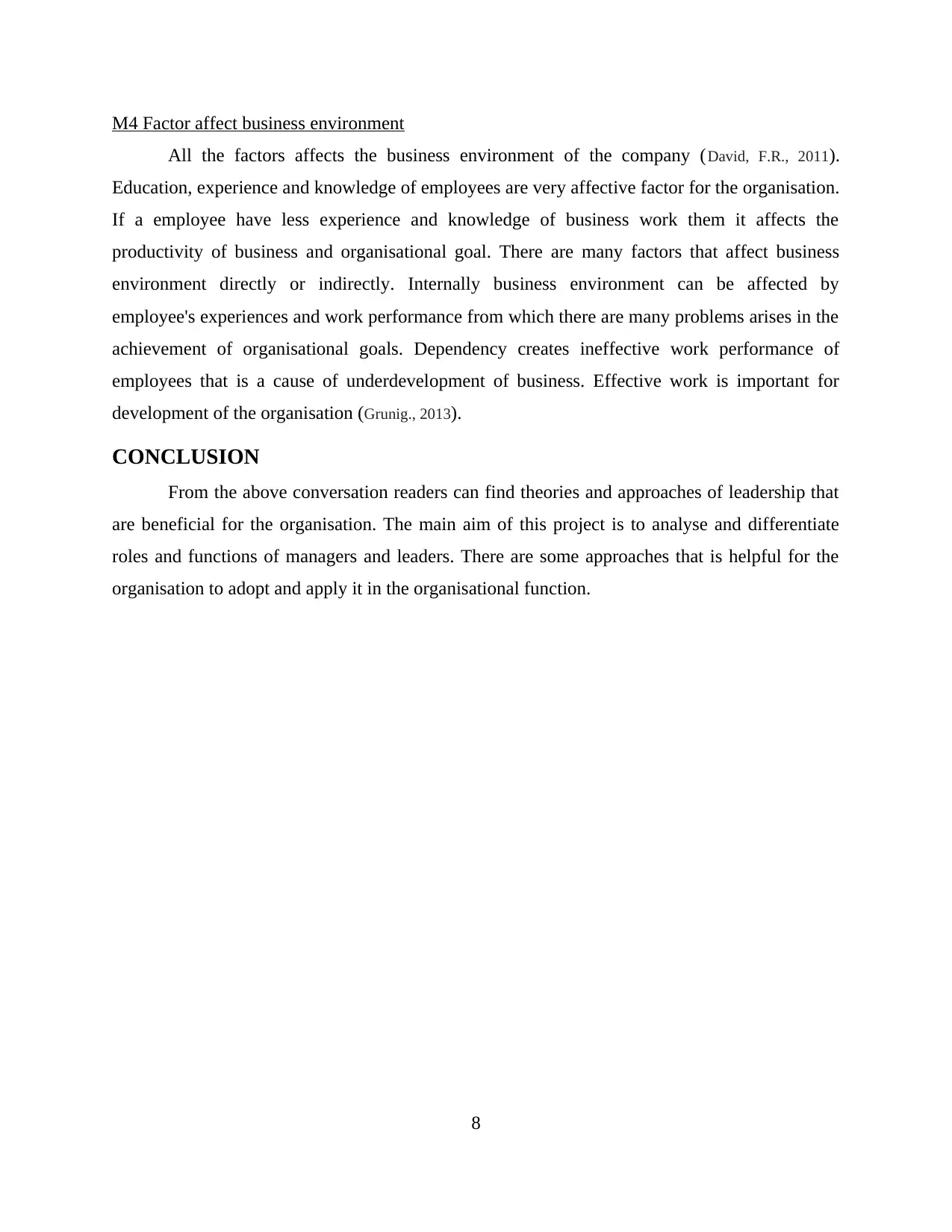
M4 Factor affect business environment
All the factors affects the business environment of the company (David, F.R., 2011).
Education, experience and knowledge of employees are very affective factor for the organisation.
If a employee have less experience and knowledge of business work them it affects the
productivity of business and organisational goal. There are many factors that affect business
environment directly or indirectly. Internally business environment can be affected by
employee's experiences and work performance from which there are many problems arises in the
achievement of organisational goals. Dependency creates ineffective work performance of
employees that is a cause of underdevelopment of business. Effective work is important for
development of the organisation (Grunig., 2013).
CONCLUSION
From the above conversation readers can find theories and approaches of leadership that
are beneficial for the organisation. The main aim of this project is to analyse and differentiate
roles and functions of managers and leaders. There are some approaches that is helpful for the
organisation to adopt and apply it in the organisational function.
8
All the factors affects the business environment of the company (David, F.R., 2011).
Education, experience and knowledge of employees are very affective factor for the organisation.
If a employee have less experience and knowledge of business work them it affects the
productivity of business and organisational goal. There are many factors that affect business
environment directly or indirectly. Internally business environment can be affected by
employee's experiences and work performance from which there are many problems arises in the
achievement of organisational goals. Dependency creates ineffective work performance of
employees that is a cause of underdevelopment of business. Effective work is important for
development of the organisation (Grunig., 2013).
CONCLUSION
From the above conversation readers can find theories and approaches of leadership that
are beneficial for the organisation. The main aim of this project is to analyse and differentiate
roles and functions of managers and leaders. There are some approaches that is helpful for the
organisation to adopt and apply it in the organisational function.
8
Paraphrase This Document
Need a fresh take? Get an instant paraphrase of this document with our AI Paraphraser
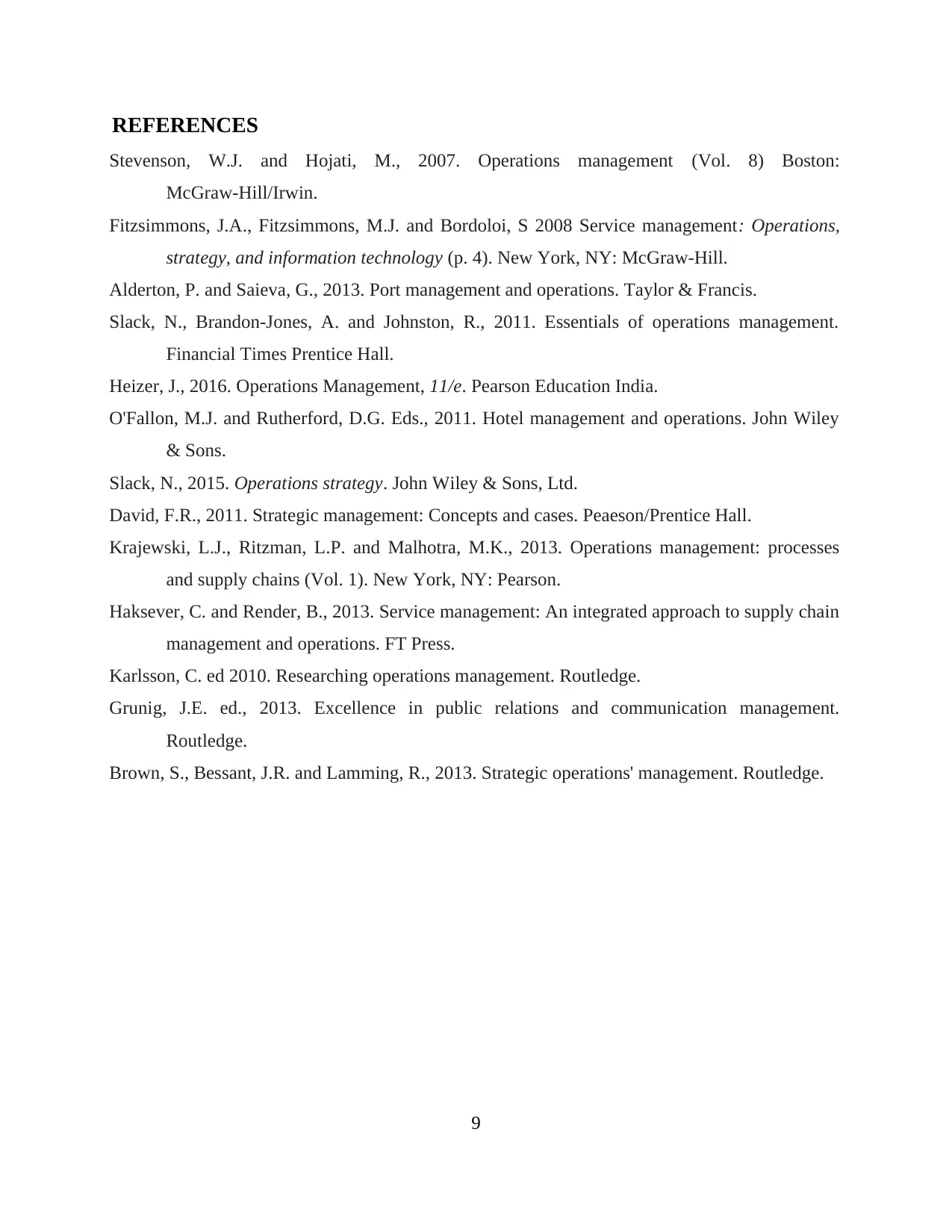
REFERENCES
Stevenson, W.J. and Hojati, M., 2007. Operations management (Vol. 8) Boston:
McGraw-Hill/Irwin.
Fitzsimmons, J.A., Fitzsimmons, M.J. and Bordoloi, S 2008 Service management: Operations,
strategy, and information technology (p. 4). New York, NY: McGraw-Hill.
Alderton, P. and Saieva, G., 2013. Port management and operations. Taylor & Francis.
Slack, N., Brandon-Jones, A. and Johnston, R., 2011. Essentials of operations management.
Financial Times Prentice Hall.
Heizer, J., 2016. Operations Management, 11/e. Pearson Education India.
O'Fallon, M.J. and Rutherford, D.G. Eds., 2011. Hotel management and operations. John Wiley
& Sons.
Slack, N., 2015. Operations strategy. John Wiley & Sons, Ltd.
David, F.R., 2011. Strategic management: Concepts and cases. Peaeson/Prentice Hall.
Krajewski, L.J., Ritzman, L.P. and Malhotra, M.K., 2013. Operations management: processes
and supply chains (Vol. 1). New York, NY: Pearson.
Haksever, C. and Render, B., 2013. Service management: An integrated approach to supply chain
management and operations. FT Press.
Karlsson, C. ed 2010. Researching operations management. Routledge.
Grunig, J.E. ed., 2013. Excellence in public relations and communication management.
Routledge.
Brown, S., Bessant, J.R. and Lamming, R., 2013. Strategic operations' management. Routledge.
9
Stevenson, W.J. and Hojati, M., 2007. Operations management (Vol. 8) Boston:
McGraw-Hill/Irwin.
Fitzsimmons, J.A., Fitzsimmons, M.J. and Bordoloi, S 2008 Service management: Operations,
strategy, and information technology (p. 4). New York, NY: McGraw-Hill.
Alderton, P. and Saieva, G., 2013. Port management and operations. Taylor & Francis.
Slack, N., Brandon-Jones, A. and Johnston, R., 2011. Essentials of operations management.
Financial Times Prentice Hall.
Heizer, J., 2016. Operations Management, 11/e. Pearson Education India.
O'Fallon, M.J. and Rutherford, D.G. Eds., 2011. Hotel management and operations. John Wiley
& Sons.
Slack, N., 2015. Operations strategy. John Wiley & Sons, Ltd.
David, F.R., 2011. Strategic management: Concepts and cases. Peaeson/Prentice Hall.
Krajewski, L.J., Ritzman, L.P. and Malhotra, M.K., 2013. Operations management: processes
and supply chains (Vol. 1). New York, NY: Pearson.
Haksever, C. and Render, B., 2013. Service management: An integrated approach to supply chain
management and operations. FT Press.
Karlsson, C. ed 2010. Researching operations management. Routledge.
Grunig, J.E. ed., 2013. Excellence in public relations and communication management.
Routledge.
Brown, S., Bessant, J.R. and Lamming, R., 2013. Strategic operations' management. Routledge.
9
1 out of 11
Related Documents
Your All-in-One AI-Powered Toolkit for Academic Success.
+13062052269
info@desklib.com
Available 24*7 on WhatsApp / Email
![[object Object]](/_next/static/media/star-bottom.7253800d.svg)
Unlock your academic potential
Copyright © 2020–2026 A2Z Services. All Rights Reserved. Developed and managed by ZUCOL.





